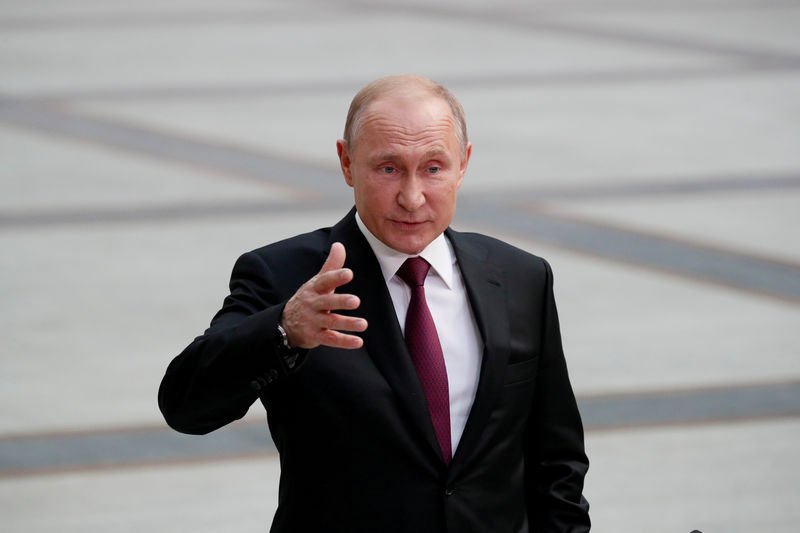MOSCOW (Reuters) - A deal between OPEC and other oil producers to curb oil output has played a positive role in stabilizing oil markets, Russian President Vladimir Putin was quoted as saying in an interview on Thursday.
Asked in the interview with the Financial Times if Russia would support extending the deal when it expires at the end of this month, Putin would not be drawn.
But he said that the stabilization of oil markets was in the interests of both crude producers and consumers. The future of the output deal is expected to be on the agenda when world leaders meet this week for the G20 summit in Osaka, Japan.
Putin said he had met with the leaders of Russia's biggest oil companies on Wednesday this week.
"We believe that our production stabilization agreements with Saudi Arabia and OPEC in general have had a positive effect on market stabilization and forecasting," he said in the FT interview.
"I believe both energy producers, in this case, oil producing countries, and consumers are interested in this, because stability is definitely in short supply at present.
"And our agreements with Saudi Arabia and other OPEC members undoubtedly strengthen stability. As for whether we will extend the agreement, you will find out in the next few days," Putin said.
Putin and Saudi Arabia’s Crown Prince Mohammed bin Salman will discuss energy issues during their meeting on the sidelines of the G20 summit.
They will meet just days before the Organization of the Petroleum Exporting Countries and other leading oil producers, including Russia, convene in Vienna to discuss the future of the global oil production cuts deal.
TENSIONS WITH WASHINGTON
Putin is scheduled to meet U.S. President Donald Trump on the sidelines of the G20 summit.
In a wide-ranging interview with the Financial Times, Putin lamented the U.S. withdrawal from the Intermediate-Range Nuclear Forces treaty, and what he said was Washington's reluctance to engage in talks on renewing the START arms control treaty.
He said Russia had offered talks with Washington on a renewed START treaty, but that the United States had taken no practical steps to reciprocate. He said he saw a threat of a new nuclear arms race.
In the interview, the Russian leader also touched on differences with Washington over trade.
He said he wanted the G20 summit to produce a commitment to draw up common rules that would be respected by all parties. He said Russia and China -- both of which have been subject to U.S. trade restrictions -- have a common interest in seeing the rules of global trade upheld.
On Venezuela, where President Nicolas Maduro, a Moscow ally, has been resisting attempts to oust him by U.S.-backed opposition leader Juan Guaido, Putin denied Russian had deployed troops there.

He said Russia was not meddling in Venezuela's affairs. But he said that Guaido did not have the right to go out into the street and unilaterally declare himself president. That status could only be conferred through elections, Putin said.